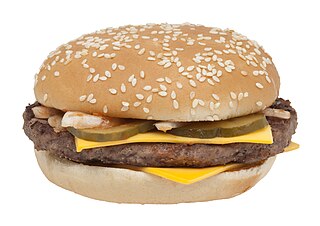
Ronald Martin Popeil, was an American inventor and marketing personality, and founder of the direct response marketing company Ronco. He made appearances in infomercials for the Showtime Rotisserie and coined the phrase "Set it, and forget it!" as well as popularizing the phrase, "But wait, there's more!" on television as early as the mid-1950s.

A hamburger or simply burger is a food consisting of fillings—usually a patty of ground meat, typically beef—placed inside a sliced bun or bread roll. Hamburgers are often served with cheese, lettuce, tomato, onion, pickles, bacon, or chilis; condiments such as ketchup, mustard, mayonnaise, relish, or a "special sauce", often a variation of Thousand Island dressing; and are frequently placed on sesame seed buns. A hamburger patty topped with cheese is called a cheeseburger.

Boston Market Corporation, known as Boston Chicken until 1995, is an American fast casual restaurant chain headquartered in Golden, Colorado. It is owned by the Rohan Group.

Pork roll is a processed meat commonly available in New Jersey and neighboring states. It was developed in 1856 by John Taylor of Trenton, and sold as "Taylor's Prepared Ham" until 1906. Though since then food labeling regulations require Taylor and all other manufacturers to label it "pork roll", people in northern New Jersey still refer to it as "Taylor ham". The "Is it pork roll or Taylor ham?" question is a notable element of New Jersey culture, and the division over what name one uses divides the state along roughly north–south geographic lines.

Krystal is an American regional fast food restaurant chain headquartered in Dunwoody, Georgia, with restaurants in the Southeastern United States and Puerto Rico. It is known for its small, square hamburgers, called sliders in places other than the Southeast, with steamed-in onions. Krystal moved its headquarters from Chattanooga, Tennessee, where it had been based since 1932, to the Atlanta suburb of Dunwoody in early 2013.

Wonder Bread is an American brand of sliced bread. Established in Indianapolis, Indiana, in 1921, it was one of the first companies to sell pre-sliced bread nationwide by 1930. The brand is currently owned by Flowers Foods in the United States.

Cup Noodles is a brand of cup instant ramen developed in 1971 and manufactured by Japanese food company Nissin Foods. Single servings of the product are packaged in foam, plastic, or paper cups and are prepared by adding boiling water.

A pie iron—also called pudgy pie iron, sandwich toaster, snackwicher, toastie maker—is a cooking appliance that consists of two hinged concave, round or square, cast iron or aluminium plates on long handles. Its "clamshell" design resembles that of a waffle iron, but without that appliance's honeycomb pattern. Pie irons are used to heat, toast and seal the sandwich.

Ginsu is a brand of direct marketed knives. The brand is owned by the Douglas Quikut Division of Scott Fetzer, a Berkshire Hathaway Company. The brand was heavily promoted in the late 1970s and 1980s on U.S. television using infomercials characterized by hawker and hard sell pitch techniques. The commercials generated sales of between two and three million Ginsu sets between 1978 and 1984.
Gardenburger is the brand name of a veggie burger sold in the United States. It was developed in the early 1980s by Paul Wenner, the owner of the Gardenhouse, a vegetarian restaurant in Gresham, Oregon. It is currently owned by Kellanova.

Borden Dairy Company is an American dairy processor and distributor headquartered in Dallas, Texas. Established in 2009, the company is a successor to the original Borden Company established in 1857 by Gail Borden. The company is a former subsidiary of Dean Foods.

K-tel International Ltd is a Canadian company which formerly specialized in selling consumer products through infomercials and live demonstration. Its products include compilation music albums, including The Super Hits series, The Dynamic Hits series and The Number One Hits series and consumer products, including the Record Selector, the Veg-O-Matic, the Miracle Brush, and the Feather Touch Knife. The company has sold more than half a billion units worldwide.

Veg-O-Matic is the name of one of the first food-processing appliances to gain widespread use in the United States. It was non-electric and invented by Samuel J. Popeil and later sold by his son Ron Popeil along with more than 20 other distributors across the country, and Ronco, making its debut in 1963 at the International Housewares Show in Chicago, Illinois. It was also sold in Australia by Philip Kives, who purchased it from Samuel Popeil and sold it as one of the first products through his own marketing firm, K-tel.
In marketing, a product demonstration is a promotion where a product is demonstrated to potential customers. The goal is to introduce customers to the product in hopes of getting them to purchase that item.
Philip Kives was a Canadian business executive, entrepreneur, and marketing expert from Winnipeg, Manitoba. He is best known for founding K-tel, which sold household gadgets including the Miracle Brush, Feather Touch Knife, Veg-O-Matics, as well as many compilation record albums.
Lisa Stephanie Popeil is an American voice coach, singer, and musician. She is the creator of the trademarked Voiceworks Method and, as a voice coach, specializes in the pedagogy of vocal styles.
Metal Ware Corporation is a company located in Two Rivers, Wisconsin and manufactures small kitchen appliances primarily marketing them under the NESCO and American Harvest brand names.

Vegetable chips are chips (crisps) that are prepared using vegetables other than potatoes. Vegetable chips may be fried, deep-fried, dehydrated, dried, or baked. Many different root vegetables or leaf vegetables may be used. Vegetable chips may be eaten as a snack food and may accompany other foods such as dips, or be used as a topping on dishes. In the United States, vegetable chips are often mass-produced, with many brands marketed to consumers.

Follow Your Heart is a vegan and vegetarian food company that began in 1970 as a restaurant in Canoga Park, California. In 1977, they began selling Vegenaise, an egg-free mayonnaise substitute whose name is a portmanteau of vegetarian and mayonnaise. The company now also produces other lines of vegan food, such as vegan cheeses, salad dressings, and VeganEgg.














